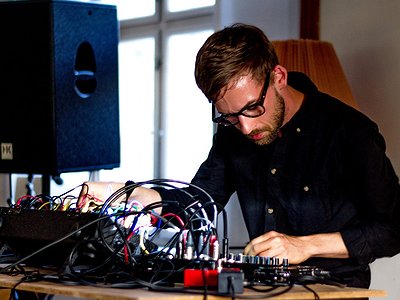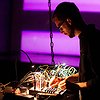Part 2
There are many descriptions of the ideal state of mind for being creative. What is it like for you? What supports this ideal state of mind and what are distractions? Are there strategies to enter into this state more easily?
For me, it’s a matter of having access to a certain setup, e.g. a specific tool or limited set of tools I want to work with for a period of time, not think too much, turn it on and just start working. I often get confused about having too many possibilities in my studio, and I tend to be more creative when I really limit the setup - or when I’m working somewhere else and only have access to my laptop, or for instance one synthesizer, then finishing and producing later when I’m back. Distractions are obviously also all the things happening around you: meetings, concerts, festivals – which are all important, for instance: inspiration from pieces and for new formats, listening situations – sometimes I just need to be in my own bubble, at least when I’m very focused on a specific project or concert.
How do you make use of technology? In terms of the feedback mechanism between technology and creativity, what do humans excel at, what do machines excel at?
I’m interested in the combination of this more or less uncontrollable technology, surprises and very reliable, controllable things like the computer, samplers, mixers, audio players, and that’s what I use most of the time, live and in the studio. When the technology somehow has a life of its own, it can feel like working with another person or musician, you ask a question and get something you didn’t think of; and then it’s about twisting that and making it work in a musical context. Sometimes I’m in a good flow with this, creating lots of material/recordings, and for me that’s when this feedback loop makes sense and gets interesting. I’m not really interested in complete chaos or randomness. And as a human and an artist you observe and control it, make decisions about how you want it to sound, behave; the same effect or device can sound extremely harsh, cold or organic and pleasing to the ear, depending on who’s operating it.
Production tools, from instruments to complex software environments, contribute to the compositional process. How does this manifest itself in your work? Can you describe the co-authorship between yourself and your tools?
I work with simple, common tools, and I guess I try to use these in my own, personal and quite limited way. When I work with synthesizers, it’s often a small number of things interacting somehow (these days I try to avoid many hours of patching and tryouts) and then I try to get the best possible sounding recording out of that; often running the recording through the same things, multiple times, then moving to the computer to edit these recordings. I’m quite obsessed with the quality of sounds, mixing etc. and sometimes/probably spend too much time on that… Before I start recording a new track/layer I always try to see how much sound I can extract from one very simple thing (one sound or loop, or synthesizer recording) by using short samples or textures based on the original. Sometimes it’s just one extra “shadow”, sometimes none, but most of the time it’s at least 3-4 things before I move on. The idea is to make works or tracks, based on this approach, sound simple and repetitive, and at the same time complex/dense so that the listener can always follow that one, main idea and/or listen to the details around it.
How do you see the relationship between sound, space and performance and what are some of your strategies and approaches of working with them?
For the live part: using the speakers/sound system, the room and its resonances or tone as part of the “instrument” (without being too conceptual about it), emphasizing and playing with various parts, frequencies. Another very direct way of working with sound & space is obviously having multiple speaker channels, or diffusion on multiple speakers, and to work with movements, rotations etc.; that’s something I’m very interested in these days and will be experimenting more with in near future. One thing I find very beautiful and poetic somehow is loudspeaker concerts / listening sessions with no performer on stage, somewhere between an installation and a concert, and only about the sound itself. I also believe that a performance can well be some kind of anti-performance, if the music/sound is strong enough – personally, as a listener, I don’t need any performance element if I really like what comes out of the speakers, and as you know that at least some of the sounds are being generated/processed/diffused live, it still makes sense to have the performer on stage.
Our sense of hearing shares intriguing connections to other senses. From your experience, what are some of the most inspiring overlaps between different senses - and what do they tell us about the way our senses work? What happens to sound at its outermost borders?
Between hearing and seeing, the combination of audio and video or video signals; either when the two are really synchronized and become one thing, or when they go against each other and interact in a more abstract way. Obviously, sound can really change how you look at something and vice versa; I guess most people need to associate and/or see something when they listen to a sound, for me it’s more concrete and I constantly have this film/drawing in my mind when listening to pieces, but many always mention birds, water, the ocean etc. … If an audiovisual concept or performance/piece is really strong, I think it can make people think less about these associations while listening and see it more as an independent piece of art, more like a sculpture or painting; at least I experienced this at certain concerts and installations. At the same time, I’m critical and often feel that, for instance, very synchronized things can quickly become boring or perhaps unnecessary – if the sounds are of a certain quality or materiality, and the music already has a visual quality to it, then it’s often enough, and more like looking at an abstract painting, the listener is free to imagine and see, draw whatever he or she wants, follow or pay attention to certain sounds, elements.
Art can be a purpose in its own right, but it can also directly feed back into everyday life, take on a social and political role and lead to more engagement. Can you describe your approach to art and being an artist?
I believe that music and art improves society, but it’s a personal project - I’m always pleased when someone tells me they had a positive or special experience after listening, but I’m very aware that it’s not my job to be political.
It is remarkable, in a way, that we have arrived in the 21st century with the basic concept of music still intact. Do you have a vision of music, an idea of what music could be beyond its current form?
Not really, but to continue from the previous question, music/sound is a very universal language and I hope it will continue to exist, more or less in its current form, for many years to come.






